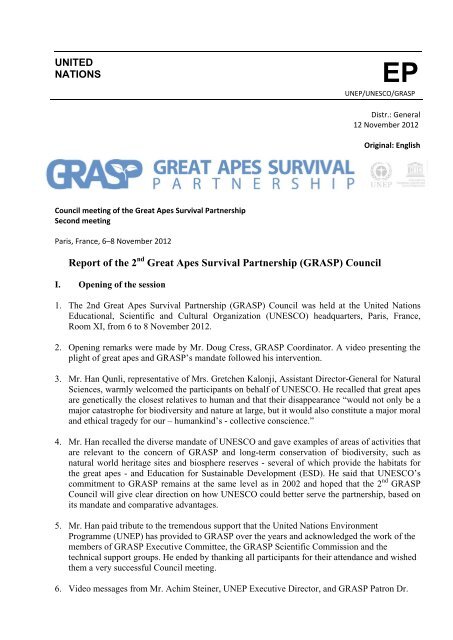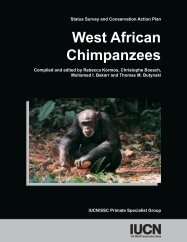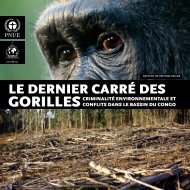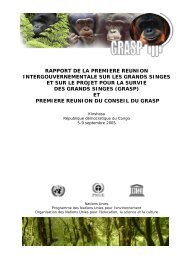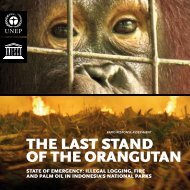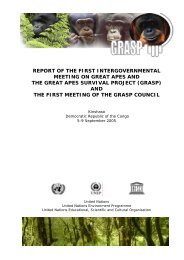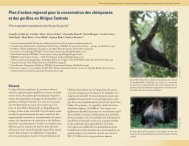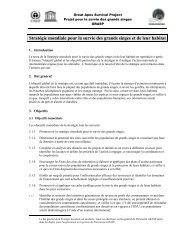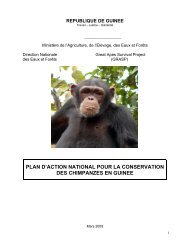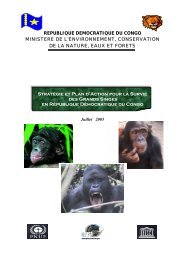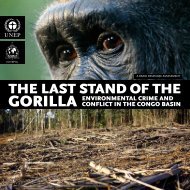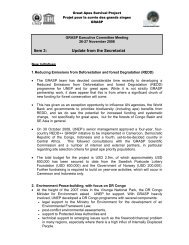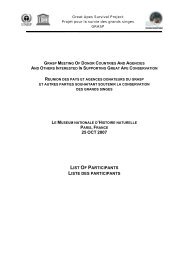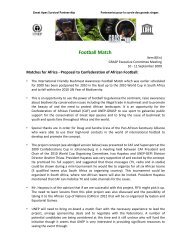English - GRASP
English - GRASP
English - GRASP
Create successful ePaper yourself
Turn your PDF publications into a flip-book with our unique Google optimized e-Paper software.
UNITED<br />
NATIONS<br />
EP<br />
UNEP/UNESCO/<strong>GRASP</strong><br />
Distr.: General<br />
12 November 2012<br />
Original: <strong>English</strong><br />
Council meeting of the Great Apes Survival Partnership<br />
Second meeting<br />
Paris, France, 6–8 November 2012<br />
Report of the 2 nd Great Apes Survival Partnership (<strong>GRASP</strong>) Council<br />
I. Opening of the session<br />
1. The 2nd Great Apes Survival Partnership (<strong>GRASP</strong>) Council was held at the United Nations<br />
Educational, Scientific and Cultural Organization (UNESCO) headquarters, Paris, France,<br />
Room XI, from 6 to 8 November 2012.<br />
2. Opening remarks were made by Mr. Doug Cress, <strong>GRASP</strong> Coordinator. A video presenting the<br />
plight of great apes and <strong>GRASP</strong>’s mandate followed his intervention.<br />
3. Mr. Han Qunli, representative of Mrs. Gretchen Kalonji, Assistant Director-General for Natural<br />
Sciences, warmly welcomed the participants on behalf of UNESCO. He recalled that great apes<br />
are genetically the closest relatives to human and that their disappearance “would not only be a<br />
major catastrophe for biodiversity and nature at large, but it would also constitute a major moral<br />
and ethical tragedy for our – humankind’s - collective conscience.”<br />
4. Mr. Han recalled the diverse mandate of UNESCO and gave examples of areas of activities that<br />
are relevant to the concern of <strong>GRASP</strong> and long-term conservation of biodiversity, such as<br />
natural world heritage sites and biosphere reserves - several of which provide the habitats for<br />
the great apes - and Education for Sustainable Development (ESD). He said that UNESCO’s<br />
commitment to <strong>GRASP</strong> remains at the same level as in 2002 and hoped that the 2 nd <strong>GRASP</strong><br />
Council will give clear direction on how UNESCO could better serve the partnership, based on<br />
its mandate and comparative advantages.<br />
5. Mr. Han paid tribute to the tremendous support that the United Nations Environment<br />
Programme (UNEP) has provided to <strong>GRASP</strong> over the years and acknowledged the work of the<br />
members of <strong>GRASP</strong> Executive Committee, the <strong>GRASP</strong> Scientific Commission and the<br />
technical support groups. He ended by thanking all participants for their attendance and wished<br />
them a very successful Council meeting.<br />
6. Video messages from Mr. Achim Steiner, UNEP Executive Director, and <strong>GRASP</strong> Patron Dr.
Jane Goodall, founder of the Jane Goodall Institute and a UN Messenger of Peace, were<br />
presented. Mr. Steiner began by thanking UNESCO for hosting the Council meeting. After a<br />
brief report on great apes conservation trends in nature, which are under a greatest threat than<br />
they were the previous decades, he highlighted the unique nature of <strong>GRASP</strong> as a partnership<br />
and stated the hope of UNEP to re-launch <strong>GRASP</strong> effectively. Dr. Goodall said that a lot had<br />
already been accomplished by <strong>GRASP</strong> but that <strong>GRASP</strong> needed to develop new strategies<br />
urgently so that future generations can enjoy great apes too. She highlighted the wealth of talent<br />
in the room and wished the meeting great success to ensure the survival of great apes.<br />
II.<br />
Organizational matters<br />
A. Election of the Bureau of the Council<br />
7. The Council elected its Bureau as follows:<br />
• Chair: M. Jean-Patrick Leduc (France)<br />
• Vice-Chair: M. John Mshelbwala (Nigeria)<br />
8. The chairman thanked the audience. He stressed that the partnership was a good initiative that<br />
needed to be developed further. He invited participants to use this meeting as an opportunity to<br />
revive it. He added that the results of this meeting will depend on the commitment of the<br />
participants.<br />
B. Adoption of the Agenda<br />
9. The representatives adopted the agenda proposed by the Secretariat<br />
(UNEP/UNESCO/<strong>GRASP</strong>/COUNCIL.2/1) with slight changes in the order of some presentations.<br />
Tuesday, 06 November 2012<br />
1. 2 nd Grasp Council Opening Ceremony<br />
2. Organizational matters – First day;<br />
(a) Election of the Chair of the meeting<br />
(b) Adoption of the agenda<br />
(c) Organization of work<br />
(d) Report of the <strong>GRASP</strong> Executive Committee<br />
(e) Report of the <strong>GRASP</strong> Scientific Commission<br />
(f) Report by the <strong>GRASP</strong> Secretariat<br />
(g) <strong>GRASP</strong> - Ian Redmond Conservation Award<br />
(h) Report of <strong>GRASP</strong> Strategic Review<br />
3. Great Apes Seminar<br />
(a)<br />
Great Apes & Illegal Trade<br />
4. Organizational matters<br />
(a) Discussion of draft revision Global Strategy on the<br />
Protection of Great Apes and their Habitat<br />
Wednesday, 07 November 2012<br />
1. Organizational matters<br />
2<br />
Rules for the organization and management of the <strong>GRASP</strong> Partnership
(a) Discussion of draft <strong>GRASP</strong> Priority Plan 2013-2016<br />
(b) Draft Patron Presentation<br />
(c) Discussion of draft revised Rules for Management of<br />
<strong>GRASP</strong><br />
2. Great Apes Seminar<br />
(a) Great Apes & Green Economy (and one intervention on<br />
the subject “Great Apes and Technology” made by M. Christophe Boesch)<br />
Thursday, 08 November 2012<br />
1. Organizational matters<br />
(a) Discussion of draft revised Global Strategy for Great<br />
Apes (cont.)<br />
(b) Discussion of draft revised Rules for Management of<br />
<strong>GRASP</strong> (cont.)<br />
(c) Discussion of draft <strong>GRASP</strong> Priority Plan 2013-2016<br />
(cont.)<br />
(d) Election of Executive Committee<br />
(e) Discussion<br />
(f) Election of Executive Committee<br />
2. Great Apes Seminar<br />
(a) Great Ape and Technology<br />
3. Closing Ceremony<br />
(a) Any other business<br />
(b) Adoption of the report, recommendations and decisions<br />
(c) Closing remarks<br />
(d) Adjournment of the <strong>GRASP</strong> Council<br />
C. Organization of work<br />
10. Plenary sessions took place every morning from 9 a.m. to 1 p.m., followed by seminar sessions<br />
in the afternoons.<br />
11. Three documents were presented for discussion: the Global Strategy for the Protection of Great<br />
Apes and their Habitat; the Rules for the Organization and Management of <strong>GRASP</strong>; and the<br />
<strong>GRASP</strong> Priority Plan 2013-2016.<br />
D. Attendance<br />
12. The meeting was attended by 134 delegates, representing all categories of <strong>GRASP</strong> partners.<br />
III. Tuesday, 06 November 2012<br />
A. Morning session: Organizational matters<br />
13. A presentation was made by Mr. Aggrey Rwetsiba, Chair of the <strong>GRASP</strong> Executive<br />
Committee.<br />
Rules for the organization and management of the <strong>GRASP</strong> Partnership 3
14. It was followed by a presentation Mr. Serge Wich, chair of Scientific Commission<br />
15. Finally, the report of the <strong>GRASP</strong> Secretariat was proposed by Mr. Johannes Refisch.<br />
16. Following these presentations, the Chair invited comments from participants.<br />
17. Creation of the <strong>GRASP</strong>- Ian Redmond Conservation Award was announced. The <strong>GRASP</strong> -<br />
Ian Redmond Conservation Award was established to support and inspire young<br />
conservationists working towards the protection of great apes and their habitat in Africa and<br />
Asia.<br />
18. <strong>GRASP</strong> Strategic Review<br />
The Secretariat submitted the <strong>GRASP</strong> Strategic Review, which was welcomed by participants.<br />
They recognized the need to improve <strong>GRASP</strong>’s structure, to redefine its action plan, to reinforce<br />
the <strong>GRASP</strong> Focal Points and to benefit from UN influence.<br />
18. Afternoon session: Great Apes Seminar<br />
18. Great Apes & Illegal Trade.<br />
Four presentations about the illegal trade of great apes were made:<br />
• Mr. John Scanlon, Secretary-General of the CITES (Convention on International Trade in<br />
Endangered Species of Wild Fauna and Flora): “Illegal Trade and Wildlife.”<br />
• Mr. Ofir Drori, Last Great Ape Organization (LAGA): “Wildlife Law Enforcement – Challenges<br />
& Solutions.”<br />
• Mr. Roland Melisch, TRAFFIC: “Trade in Great Apes with an emphasis on Southeast Asia – Great<br />
Apes and Gibbons in Crisis.”<br />
• Mr. Doug Cress, <strong>GRASP</strong> Secretariat: “<strong>GRASP</strong> Illegal Trade Survey.”<br />
19. These presentations addressed issues such as law enforcement, the need for data, the issue of<br />
corruption, the need to raise public awareness, the lack of prosecution and convictions and the role<br />
of international organizations in combating illegal trade.<br />
19. Afternoon session: Organizational matters<br />
20. Global Strategy on the Protection of Great Apes and their Habitat<br />
This document was welcomed by representatives. Comments were made and it was decided to<br />
incorporate them and present the document again to the plenary before the closure of the meeting.<br />
IV. Wednesday, 07 November 2012<br />
A. Morning session: Organizational matters<br />
21. Mr. Jacques Trouvilliez of the French Ministry of Ecology, Sustainable Development and<br />
Energy was introduced as the new Chair of the meeting.<br />
22. <strong>GRASP</strong> Priority Plan 2013-2016<br />
The <strong>GRASP</strong> Priority Plan was introduced.<br />
4<br />
Rules for the organization and management of the <strong>GRASP</strong> Partnership
23. <strong>GRASP</strong> Patron and President of Conservation International (CI), Mr. Russ Mittermeier, made a<br />
global presentation of endangered primates around the world.<br />
He also announced a contribution of US$ 5,000 from the CI Primate Action Fund to the <strong>GRASP</strong>-<br />
Ian Redmond Conservation Award.<br />
24. Rules for the Organization and Management of <strong>GRASP</strong><br />
The Secretariat presented the document. It was then discussed by participants.<br />
B. Afternoon session: Great Apes Seminar<br />
25. Four presentations about Great Apes & Green Economy were made:<br />
• Mr. Carlos Manuel Rodriguez, Conservation International (CI): “Green Economy.”<br />
• Ms. Katia Karousakis, Organisation for Economic Co-operation and Development (OECD): “Global<br />
Green Strategy.”<br />
• Mr. Michel Masozera, Wildlife Conservation Society (WCS): “Rwanda’s Transition Towards a<br />
Green Economy.”<br />
• Mr. Johannes Refisch, <strong>GRASP</strong> Secretariat: “Economics of Orangutan Conservation in Sumatra.”<br />
26. One presentation dealt with the technology now available to improve conservation of great apes and<br />
communication:<br />
• Christophe Boesch, Max Planck Institute: “APES portal and new approaches in camera/acoustic<br />
trapping.”<br />
27. The Secretariat announced that at 19:00, a working group on the draft <strong>GRASP</strong> Priority Plan<br />
2013-2016 would meet to revise the document, which will be presented to the Council the<br />
following day.<br />
V. Thursday, 08 November 2012<br />
A. Morning session: Organizational matters<br />
28. The Secretariat presented the updated Global Strategy for the Protection of Great Apes and<br />
their Habitat document.<br />
29. The Secretariat presented the updated Rules for the Organization and Management of <strong>GRASP</strong><br />
document.<br />
B. Afternoon session: Organizational matters<br />
30. Election of the members of the Executive Committee to serve for the 2013-2016 period. The<br />
following members were announced after a vote for the category E partners:<br />
a) Category A: - Novianto Bambang (Indonesia)<br />
- Dieudonné Ankara (Congo)<br />
- Aggrey Rwetsiba (Uganda)<br />
- Mamadou Sidibé (Senegal)<br />
b) Category B: - Marianne Courouble (France)<br />
c) Category C: - Neville Ash (UNEP)<br />
Rules for the organization and management of the <strong>GRASP</strong> Partnership 5
- Noeline Raondry Rakotoarisoa (UNESCO)<br />
d) Category D: - Pia Jonsson (CITES)<br />
e) Category E : - Elizabeth Macfie (Wildlife Conservation Society)<br />
- Ashley Leiman (Orangutan Foundation)<br />
31. The Secretariat presented the results of the evening working group which discussed the <strong>GRASP</strong><br />
Priority Plan 2013-2016.<br />
The rapporteur presented a draft of the meeting report and submitted it to the approval of the<br />
Council.<br />
Adoption of the report.<br />
C. Closing Ceremony<br />
6<br />
Rules for the organization and management of the <strong>GRASP</strong> Partnership


